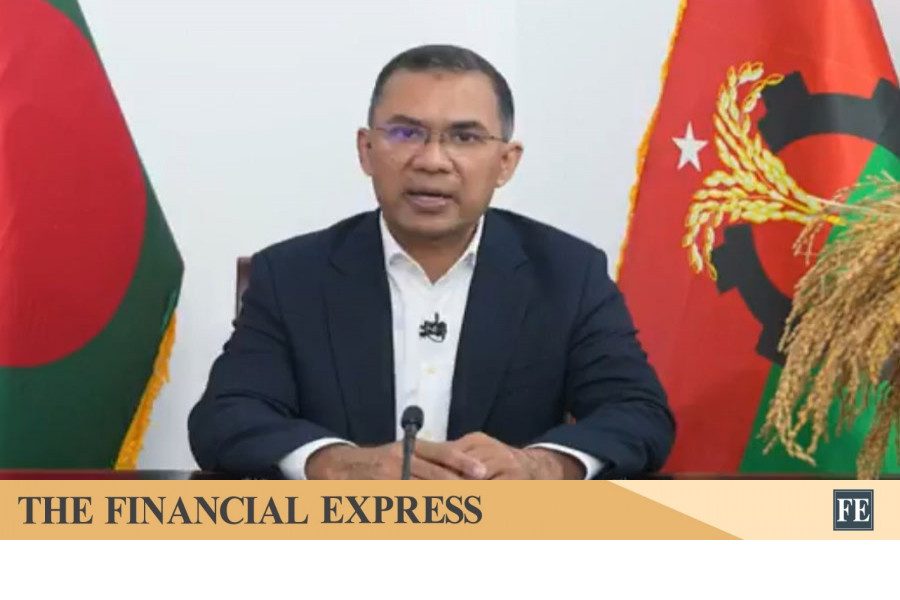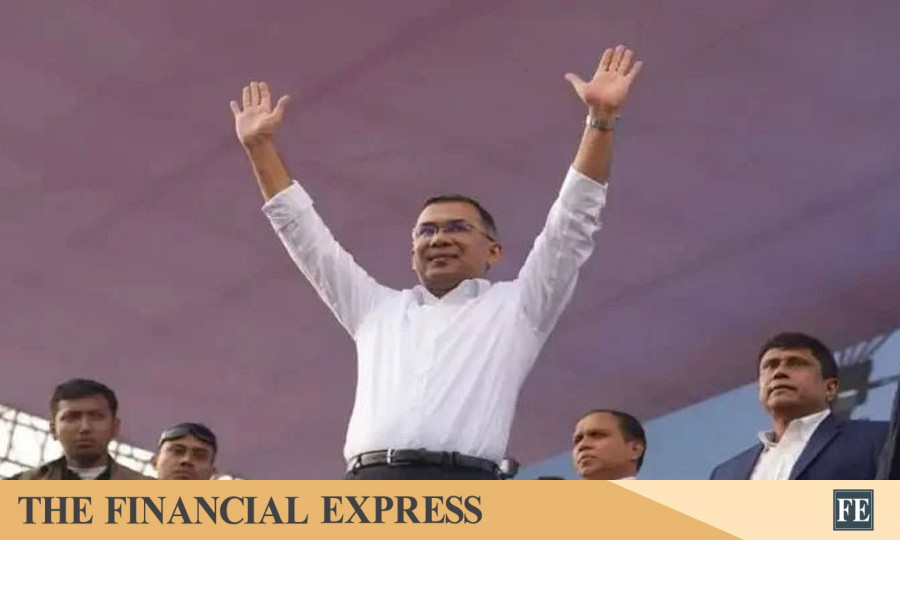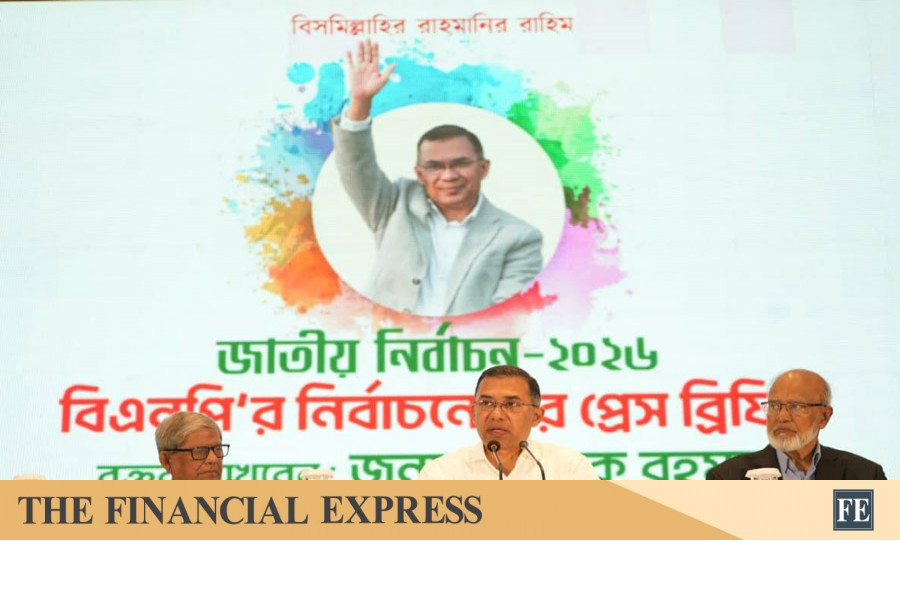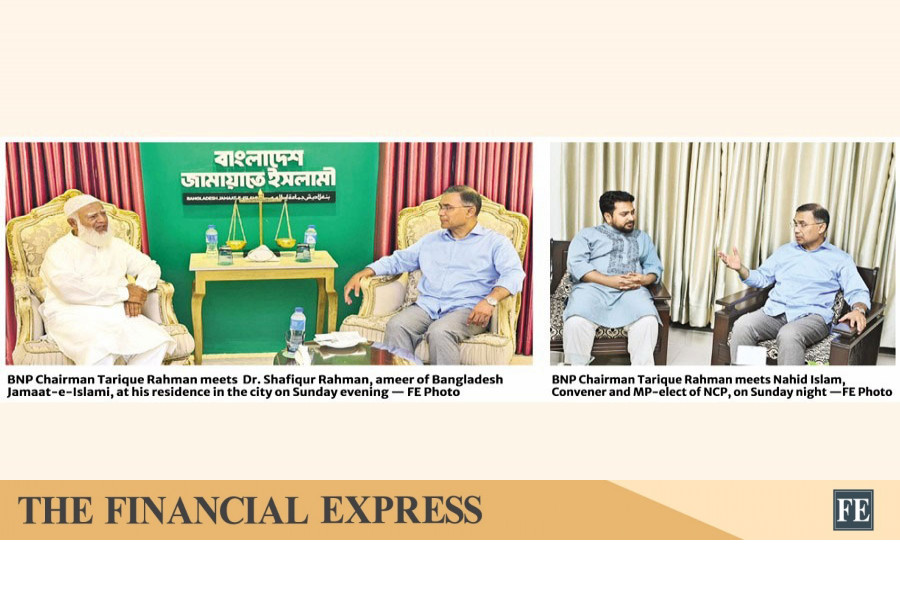Saif
Senior Member
- Joined
- Jan 24, 2024
- Messages
- 17,262
- Likes
- 8,334
- Nation

- Residence

- Axis Group


Tarique regrets party’s past mistakes, seeks votes for BNP to build safe Bangladesh
Regretting the party’s unintended mistakes in running the country in the past, BNP Chairman Tarique Rahman on Monday urged voters to cast their votes for the ‘Sheaf of Paddy’ on February-12 election to create a safe and self-reliant Bangladesh by implementing all its plans and pro
Tarique regrets party’s past mistakes, seeks votes for BNP to build safe Bangladesh
UNB
Published :
Feb 10, 2026 00:07
Updated :
Feb 10, 2026 00:07

Regretting the party’s unintended mistakes in running the country in the past, BNP Chairman Tarique Rahman on Monday urged voters to cast their votes for the ‘Sheaf of Paddy’ on February-12 election to create a safe and self-reliant Bangladesh by implementing all its plans and programmes.
“In the past, with your support, BNP had governed the country several times. While running the state during those periods, there might have been some unintentional mistakes and shortcomings on our part in certain areas. For that, I sincerely express my regret to the people of the country,” he said in a televised address on Bangladesh Television ahead of the February-12 elections.
Tarique said learning from past mistakes and building on the party’s achievements, he once again sought support in the national election on February 12 to build a safe Bangladesh for the present and future generations.
“For the country and its people, and for you and your family members, I have made various plans, and to implement each of these plans I ask for your support and your vote for the sheaf of paddy,” he said.
After his return from abroad, the BNP chief said he made every effort to reach out to people across the country in the limited time available. “I have received your love. I have felt your affection and support for BNP. February 12 will be a day to express your love for BNP once again.”
Mentioning the role of BNP founder Ziaur Rahman and former Prime Minister Khaleda Zia in developing the country and restoring democracy, Tarique said, “My humble appeal to everyone that if you love Shaheed Zia, if you love the country’s leader Begum Khaleda Zia, and if you love independence and democracy, then vote for the Sheaf of Paddy in the upcoming national election on February 12.”
He said the victory of the ‘Sheaf of Paddy’ will mean the victory of Bangladesh and will ensure a free, sovereign, and independent country. “To continue the success journey of Shaheed Zia and country leader Begum Khaleda Zia, I, together with my party’s leaders and activists, have long been preparing, hands-on, to implement BNP’s political, social, and economic programmes.”
The BNP chief said there is no alternative to strictly controlling corruption, establishing the rule of law, and ensuring the accountability of the state and the government to the people in order to implement every plan.
“If I get your support in governing the state, the government in the coming days will be accountable to the people. The BNP government, Insha’Allah, will be as strict as possible in controlling corruption in the country. The rule of law will be re-established, Insha’Allah. This is my commitment, and BNP’s commitment, to the people of the country. The reason for my commitment to you is that you are the source of all political power of the BNP,” he said.
The pre-recorded speech was aired at 7:15pm on Monday. In his 37-minute address, the BNP chief also outlined his party’s various plans and programmes included in the election manifesto.
He recalled that during what he described as the fascist period and the so-called January 7, 2024 election, he had urged citizens to spend the day with their families.
Referring to the upcoming national election in a “fascism-free Bangladesh,” he called on voters to cast their ballots for the sheaf of paddy throughout February 12 and encouraged young voters to dedicate their first vote to the BNP’s electoral symbol.
He urged democracy-loving citizens to take responsibility for BNP candidates on the election day, saying elected BNP MPs will assume responsibility for the people from the following day, while he himself will ensure that representatives properly fulfill their duties.
Tarique reiterated that if the BNP received the public mandate to govern, the party’s guiding principle would be justice inspired by the ideals of the Prophet.
“February 12 is the day for establishing the rights of the people of Bangladesh. I pray to Allah for the victory of the sheaf of paddy. Vote for the sheaf of paddy throughout the day on February 12,” he said.
Tarique also stressed a vision of a safe Bangladesh for all citizens, irrespective of religion or region, upholding freedom of belief and protection for minorities.
“During the 1971 Liberation War, no one asked about anyone’s religion. In the 2024 struggle to protect freedom, nobody asked about anyone’s religion or religious identity. We believe religion is personal, but the state belongs to everyone. Each citizen can practise their faith according to their belief,” he said.
Stating that ensuring peace and security for all citizens is the state’s responsibility, the BNP chief said, “Over the past 55 years, the democratic-minded people of Bangladesh have rejected authoritarianism, religious extremism and radicalism.”
He said everyone can work together to build a safe and secure Bangladesh by respecting each person’s religious beliefs and cultural practices.
The BNP chairman said this vision reflected the ground-breaking political philosophy--Bangladeshi nationalism—of the country’s independence proclaimer Ziaur Rahman.
He also said Bangladesh belonged to its people, regardless of party, opinion, religion, or ethnicity, and all the country’s citizens are Bangladeshis.
He highlighted BNP’s commitment to supporting religious leaders across faiths, including financial assistance for imams, khatibs, and moazzins.
With the support of people, Tarique said, the BNP had had the opportunity to run the state many times in the past.
He said their party founder Ziaur Rahman, after taking on the responsibility of running the country, transformed Bangladesh into a self-reliant nation and had to sacrifice his life for the country’s interest.
“My mother, Begum Khaleda Zia, honored the trust given to her by the people, endured imprisonment without compromise, and remained committed to Bangladesh’s welfare. She could have avoided imprisonment, but her heart was with the nation,” the BNP chief observed.
In a fascism-free Bangladesh, he said Khaleda Zia wanted to re-establish democracy in the country and ensure the rights of the people. “The time has come for Khaleda Zia’s aspiration to be fulfilled before the freedom-loving democratic people of the country. February 12 will be the day for the establishment of the state and government.”
Tarique outlined BNP’s key manifesto promises, including: family cards for women-headed households, farm cards for farmers, employment for the unemployed, financial support until employment is secured, reinstating faith and trust in Allah in the constitution, introducing a card for overseas Bangladeshis, and providing loan facilities to support citizens want to work abroad.
He stated the previous the fallen, defeated fascist forces had rendered all constitutional and statutory institutions of the country ineffective and completely politicised the administration.
The BNP leader said under BNP’s governance, every constitutional institution will operate according to constitutional rules, and administration will not be politicised; instead, rules of administration and promotions will be based on merit and ability.
Tarique also mentioned that if public administration is not established on a proper foundation, no productive outcomes can be achieved.
“We have already stated in our manifesto presented to the people that if the BNP assumes the responsibility of running the government based on the people’s verdict, the national pay scale for government officers and employees will be announced and implemented in a timely manner,” he said.
He concluded his speech with a religious invocation, appealing for blessings and welfare for all citizens: “More than 90 percent of Bangladeshis are Muslims. Our prayer to Allah is: O Allah, grant us goodness in this world and the Hereafter, and save us from the punishment of Hell.”
He said late president Ziaur Rahman had enshrined full trust in Almighty Allah in the constitution which was removed by the previous despotic government. “With Allah’s mercy, if BNP is entrusted to govern after February 12, full trust in Allah will be reinstated in the constitution, Inshallah.”
Tarique Rahman urged the country’s people to be vigilant against attempts to mislead the faithful and concluded his address by appealing to the people to vote for the Sheaf of Paddy in the upcoming election.
UNB
Published :
Feb 10, 2026 00:07
Updated :
Feb 10, 2026 00:07
Regretting the party’s unintended mistakes in running the country in the past, BNP Chairman Tarique Rahman on Monday urged voters to cast their votes for the ‘Sheaf of Paddy’ on February-12 election to create a safe and self-reliant Bangladesh by implementing all its plans and programmes.
“In the past, with your support, BNP had governed the country several times. While running the state during those periods, there might have been some unintentional mistakes and shortcomings on our part in certain areas. For that, I sincerely express my regret to the people of the country,” he said in a televised address on Bangladesh Television ahead of the February-12 elections.
Tarique said learning from past mistakes and building on the party’s achievements, he once again sought support in the national election on February 12 to build a safe Bangladesh for the present and future generations.
“For the country and its people, and for you and your family members, I have made various plans, and to implement each of these plans I ask for your support and your vote for the sheaf of paddy,” he said.
After his return from abroad, the BNP chief said he made every effort to reach out to people across the country in the limited time available. “I have received your love. I have felt your affection and support for BNP. February 12 will be a day to express your love for BNP once again.”
Mentioning the role of BNP founder Ziaur Rahman and former Prime Minister Khaleda Zia in developing the country and restoring democracy, Tarique said, “My humble appeal to everyone that if you love Shaheed Zia, if you love the country’s leader Begum Khaleda Zia, and if you love independence and democracy, then vote for the Sheaf of Paddy in the upcoming national election on February 12.”
He said the victory of the ‘Sheaf of Paddy’ will mean the victory of Bangladesh and will ensure a free, sovereign, and independent country. “To continue the success journey of Shaheed Zia and country leader Begum Khaleda Zia, I, together with my party’s leaders and activists, have long been preparing, hands-on, to implement BNP’s political, social, and economic programmes.”
The BNP chief said there is no alternative to strictly controlling corruption, establishing the rule of law, and ensuring the accountability of the state and the government to the people in order to implement every plan.
“If I get your support in governing the state, the government in the coming days will be accountable to the people. The BNP government, Insha’Allah, will be as strict as possible in controlling corruption in the country. The rule of law will be re-established, Insha’Allah. This is my commitment, and BNP’s commitment, to the people of the country. The reason for my commitment to you is that you are the source of all political power of the BNP,” he said.
The pre-recorded speech was aired at 7:15pm on Monday. In his 37-minute address, the BNP chief also outlined his party’s various plans and programmes included in the election manifesto.
He recalled that during what he described as the fascist period and the so-called January 7, 2024 election, he had urged citizens to spend the day with their families.
Referring to the upcoming national election in a “fascism-free Bangladesh,” he called on voters to cast their ballots for the sheaf of paddy throughout February 12 and encouraged young voters to dedicate their first vote to the BNP’s electoral symbol.
He urged democracy-loving citizens to take responsibility for BNP candidates on the election day, saying elected BNP MPs will assume responsibility for the people from the following day, while he himself will ensure that representatives properly fulfill their duties.
Tarique reiterated that if the BNP received the public mandate to govern, the party’s guiding principle would be justice inspired by the ideals of the Prophet.
“February 12 is the day for establishing the rights of the people of Bangladesh. I pray to Allah for the victory of the sheaf of paddy. Vote for the sheaf of paddy throughout the day on February 12,” he said.
Tarique also stressed a vision of a safe Bangladesh for all citizens, irrespective of religion or region, upholding freedom of belief and protection for minorities.
“During the 1971 Liberation War, no one asked about anyone’s religion. In the 2024 struggle to protect freedom, nobody asked about anyone’s religion or religious identity. We believe religion is personal, but the state belongs to everyone. Each citizen can practise their faith according to their belief,” he said.
Stating that ensuring peace and security for all citizens is the state’s responsibility, the BNP chief said, “Over the past 55 years, the democratic-minded people of Bangladesh have rejected authoritarianism, religious extremism and radicalism.”
He said everyone can work together to build a safe and secure Bangladesh by respecting each person’s religious beliefs and cultural practices.
The BNP chairman said this vision reflected the ground-breaking political philosophy--Bangladeshi nationalism—of the country’s independence proclaimer Ziaur Rahman.
He also said Bangladesh belonged to its people, regardless of party, opinion, religion, or ethnicity, and all the country’s citizens are Bangladeshis.
He highlighted BNP’s commitment to supporting religious leaders across faiths, including financial assistance for imams, khatibs, and moazzins.
With the support of people, Tarique said, the BNP had had the opportunity to run the state many times in the past.
He said their party founder Ziaur Rahman, after taking on the responsibility of running the country, transformed Bangladesh into a self-reliant nation and had to sacrifice his life for the country’s interest.
“My mother, Begum Khaleda Zia, honored the trust given to her by the people, endured imprisonment without compromise, and remained committed to Bangladesh’s welfare. She could have avoided imprisonment, but her heart was with the nation,” the BNP chief observed.
In a fascism-free Bangladesh, he said Khaleda Zia wanted to re-establish democracy in the country and ensure the rights of the people. “The time has come for Khaleda Zia’s aspiration to be fulfilled before the freedom-loving democratic people of the country. February 12 will be the day for the establishment of the state and government.”
Tarique outlined BNP’s key manifesto promises, including: family cards for women-headed households, farm cards for farmers, employment for the unemployed, financial support until employment is secured, reinstating faith and trust in Allah in the constitution, introducing a card for overseas Bangladeshis, and providing loan facilities to support citizens want to work abroad.
He stated the previous the fallen, defeated fascist forces had rendered all constitutional and statutory institutions of the country ineffective and completely politicised the administration.
The BNP leader said under BNP’s governance, every constitutional institution will operate according to constitutional rules, and administration will not be politicised; instead, rules of administration and promotions will be based on merit and ability.
Tarique also mentioned that if public administration is not established on a proper foundation, no productive outcomes can be achieved.
“We have already stated in our manifesto presented to the people that if the BNP assumes the responsibility of running the government based on the people’s verdict, the national pay scale for government officers and employees will be announced and implemented in a timely manner,” he said.
He concluded his speech with a religious invocation, appealing for blessings and welfare for all citizens: “More than 90 percent of Bangladeshis are Muslims. Our prayer to Allah is: O Allah, grant us goodness in this world and the Hereafter, and save us from the punishment of Hell.”
He said late president Ziaur Rahman had enshrined full trust in Almighty Allah in the constitution which was removed by the previous despotic government. “With Allah’s mercy, if BNP is entrusted to govern after February 12, full trust in Allah will be reinstated in the constitution, Inshallah.”
Tarique Rahman urged the country’s people to be vigilant against attempts to mislead the faithful and concluded his address by appealing to the people to vote for the Sheaf of Paddy in the upcoming election.






































